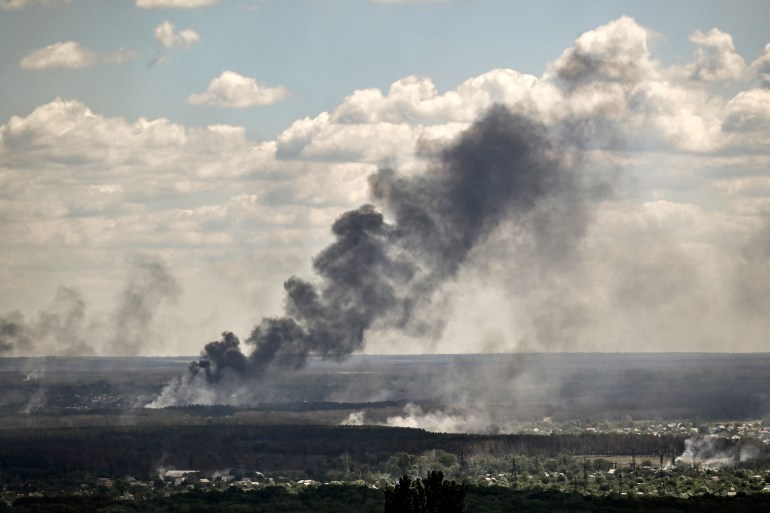Ukrainian troops ‘pushed back’ as Severodonetsk battle rages
Ukrainian troops have been pushed back in the eastern city of Severodonetsk by constant bombardment from Russian forces, and now only control its outskirts, according to a regional official.
Russia has concentrated its troops and firepower on the small eastern city in recent weeks to secure the surrounding province on behalf of separatist proxies. Ukraine has vowed to fight there for as long as possible, saying the battle could help shape the war’s future course.
After claiming to have pushed Russian forces back and secured half of the city in a surprise counter-attack last week, the governor of the surrounding Luhansk region said most of the city was again in Russian hands.
“…Our [forces] now again control only the outskirts of the city. But the fighting is still going on, our [forces] are defending Severodonetsk, it is impossible to say the Russians completely control the city,” Serhiy Haidai was quoted as saying by the RBC-Ukraine media outlet on Wednesday.
Haidai predicted earlier that Russian forces would step up their bombardment of both Severodonetsk and Lysychansk, which are separated by a river.
Ukrainian police released footage showing the evacuation of elderly people from Lysychansk. Evacuations had been cut for nearly a week by shelling of the main road out.
Russian forces have 10 times more equipment than Ukrainian troops in some areas of Severodonetsk, Ukraine’s Defence Ministry spokesman Oleksandr Motuzyanyk told a briefing.
Ukraine has urged its Western allies to speed up delivery of weapons, saying the situation would become very difficult for the country if Russia broke through its lines in the east.

Russia’s offensive is now targeting the eastern Ukraine region of Donbas, which includes Luhansk and Donetsk, after its forces were pushed back from Kyiv and other areas following the February 24 invasion.
In Sloviansk, one of the main Donbas cities still held by Ukraine, about 85km (52 miles) to the west of Severodonetsk, women with small children lined up to collect aid while other residents carried buckets of water across the city.
Most residents have fled but authorities say around 24,000 remain in the city, in the path of an expected assault by Russian forces regrouping to the north.
Moscow says it is engaged in a “special military operation” to disarm and “denazify” its neighbour. Ukraine and allies call this a baseless pretext for a war that has killed thousands, flattened cities and forced millions of people to flee.
Grain exports stalled
Russia’s Foreign Minister Sergey Lavrov, after meeting his Turkish counterpart Mevlut Cavusoglu, said Moscow was ready to guarantee the safety of vessels carrying grain from Ukrainian ports, in cooperation with Turkey, but Ukraine must remove mines first.
“We are ready to do this in cooperation with our Turkish colleagues,” Lavrov told reporters in the Turkish capital, Ankara, amid stark warnings of grain shortages worldwide partly blamed on Russia’s invasion.
Meanwhile, Cavusoglu called Russian demands for an end to sanctions to help grain onto the world market “legitimate”.
“If we need to open up the international market to Ukrainian grain, we see the removal of obstacles standing in the way of Russia’s exports as a legitimate demand,” he said.
However, Ukraine said on Wednesday that it would not demine waters around the Black Sea port of Odesa to allow grain exports, citing the threat of Russian attacks on the city. Lavrov said Russian President Vladimir Putin had personally promised not to use the grain shipment issue to benefit Russia’s military operation.
At the request of the United Nations, Turkey has offered its services to escort maritime convoys from Ukrainian ports, despite the presence of mines, some of which have been detected near the Turkish coast.
The war’s economic impact continued to reverberate, with the World Bank cutting its global growth estimate to 2.9 percent, 1.2 percentage points below the January forecast, due largely to the invasion.




